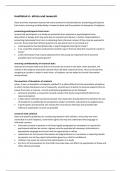hoofdstuk 4 - ethics and research
there are three important issues that every researcher should address: protecting participants
from harm, ensuring confidentiality of research data and the question of deception of subjects.
protecting participants from harm:
ensure that participants in a study are protected from physical or psychological harm,
discomfort or danger that may arise due to research procedures. a further responsibility in
protecting individuals from harm is obtaining their informed consent if they may be exposed to
any risk. three important ethical questions to aks about harm in any study are:
• could people be harmed (physically or psychologically) during the study?
• if so, could the study be conducted in another way to find out what the researcher wants to
know?
• is the information that may be obtained from this study so important that it warrants
possible harm to the participants?
ensuring confidentiality of research data
researchers should make sure that no one else has access to the data. when possible, the
names of the subjects should be removed from all data collection forms. this can be done by
assigning a number or letter to each form, of subjects can be asked to furnish information
anonymously
the question of deception of subjects
when, if ever, is deception of subjects justified? it is often difficult to find naturalistic situations
in which certain behaviours occur frequently. sometimes it is better to deceive subjects than to
cause them pain or trauma. current professional guidelines are as followed:
• whenever possible, a researcher should conduct the study using methods that do not
require deception
• if alternative methods cannot be devised, the researcher should determine whether the use
of deception is justified by the prospective study’s scientific, educational or applied value
• if participants are deceived, the researcher must ensure that they are provided with
sufficient explanation as soon as possible
research with children
there are specific guidelines for conducting research with children, since they are more
vulnerable in some respects, have fewer rights and may not understand the language of
informed consent
• informed consent of parents or of those legally designated as caretakers is required for
participants defined as minors. signers must be provided all necessary information in
appropriate language and must have the opportunity to refuse
• researchers do not present themselves as diagnosticians or counselors in reporting results
to parents, nor do they report information given by a child in confidence
• children may never be coerced into participation in a study
• any form of remuneration for the child’s services does not affect the application of these and
other ethical principles
, hoofdstuk 7 - instrumentation
what are data?
the term data refers to the kinds of information researchers obtain on the subjects or
participants of their research. demographic information (age, gender, religion..) is one kind of
data, scores from a commercially available test are another.
the whole process of preparing to collect data is called instrumentation. it involves not only the
selection or design of the instruments but also the procedures and the conditions under which
the instruments will be administered. several questions arise:
• where will the data be collected? refers to location; classroom, on the streets, at home …
• when will the data be collected? refers to time; in the morning, evening, weekend, …
• how often will the data be collected? refers to frequency; once, twice, more often, …
• who is to collect the data? refers to administration; the researcher, someone else, …
an instrument should be good in terms of validity, reliability and objectivity
• validity looks at the defensibly of the inference researchers make from the data collected
through the use of an instrument, is the data measuring what it needs to measure?
• reliability looks at consistency. a reliable instrument is one that gives consistent results
• objectivity refers to the absence of subjective judgements
means of classifying data collection instruments
instruments can be classified in a number of ways. here are some of the most useful
• who provides the information?
o researcher instruments: researchers get information themselves (e.g. observation)
o subject instruments: the subjects provide information (e.g. survey)
o informant instruments: others (parents, teachers) provide information
• where did the instruments come from?
o find and administer a previously existing instrument of some sort
o administer an instrument the researcher personally developed or had developed by
someone else
• written response versus performance
o written response instruments include objective tests, questionnaires, rating scales
and checklists
o performance instruments include any device designed to measure either a
procedure or a product. procedures are ways of doing things, products are the end
results of procedures
examples of data construction instruments
• rating scales: a measured judgement of some sort. both behaviours and products can be
rated
• interview protocol: a set of questions to be answered by the subject of the study
• observation forms: structurally recording certain observed behaviour
• tally sheet: recording frequency of student behaviour, activities or remarks
• performance checklists: list of behaviours that make up a certain kind of performance
• anecdotal records: record of observed behaviours written down in the form of anecdotes.
o four kinds: evaluative, interpretive, generalized and specific
• a lot more instruments, see book for full list





